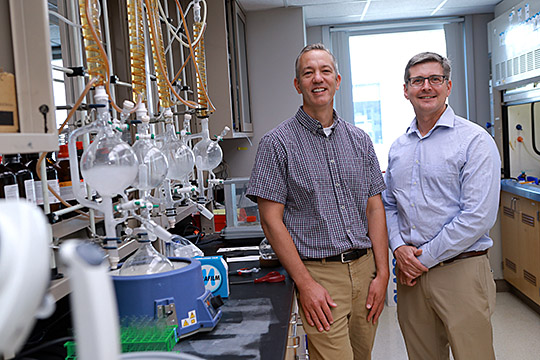The National Institutes of Health awarded a team of chemists at The University of Toledo a five-year, $2.1 million grant to create a new, more effective drug to treat tuberculosis, the most common cause of death from an infectious disease worldwide.
The grant renews funding through 2023 for the project that combats drug resistance to current antibiotics.

Dr. Donald Ronning, left, and Dr. Steve Sucheck are using a five-year, $2.1 million grant from the National Institutes of Health to develop a better drug to treat tuberculosis.
“Antibiotics discovered 60 years ago are becoming obsolete as bacteria naturally evolve to outsmart drug therapies,” Sucheck said. “Mycobacterium tuberculosis, which kills 1.5 million people a year, is one of a number of bacteria that have become increasingly drug-resistant.”
“We’re designing an antibiotic to shorten the time it takes to clear the infection,” Ronning said. “Instead of six to 24 months, we’re aiming for a therapy of two weeks, like treating strep throat or an ear infection, as well as reducing the side effects.”
The team has published several papers about breakthroughs in their ongoing research in journals, including Nature Communications, Scientific Reports and the Journal of Biological Chemistry, as well as the American Chemical Society’s journals Biochemistry and Infectious Diseases.
“We’ve used X-rays to structurally characterize two targets and are making progress in understanding how to better hit those targets to make a molecule that is going to be much more potent against the bacterium that causes tuberculosis,” Ronning said.
The research centers around inhibiting two essential classes of enzymes found in Mycobacterium tuberculosis. One is called the antigen 85 Complex that the researchers learned changes shape as it performs its job in the cell, making the protein more vulnerable to some of the compounds the lab has been testing. The second enzyme class synthesizes long polymers of sugar. Inhibiting this enzyme promotes an accumulation of compounds toxic to the bacterium and leads to rapid killing.
“There is a tremendous need to identify new drugs and new drug targets that can be used to treat this increasingly drug-resistant bacteria,” Sucheck said. “We are creating something that has never been made. The work is urgent because many cases of TB are almost impossible to treat.”